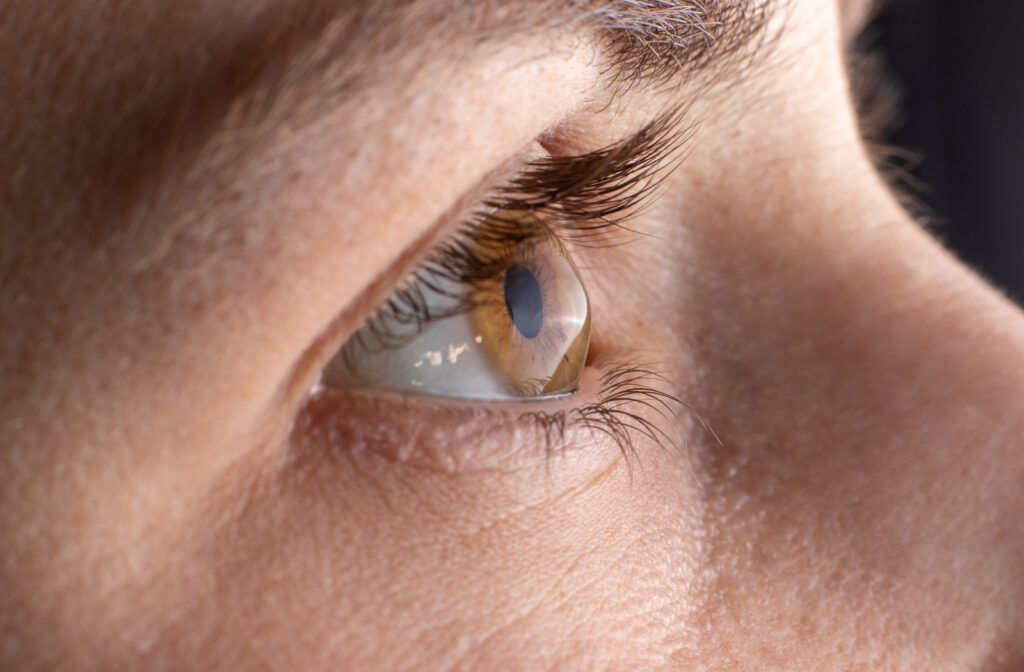Keratoconus is a condition that affects your cornea and can compromise your vision, making it difficult to perceive your surroundings. Keratoconus can’t be cured or reversed, but depending on how advanced your keratoconus is, there are treatments and solutions we can offer that can prevent progression and provide clear vision.
At Specialty Eye, our specially trained doctors can detect and treat keratoconus using a variety of solutions, including specialty contact lenses.
What Is Keratoconus?
The cornea is the transparent surface of the eye that bends incoming light to reach the retina and produce clear vision. A typical cornea is a rounded dome, but for those with keratoconus, the cornea becomes thin and bulges out into a cone shape. When your cornea is misshapen, light isn’t focused on your retina correctly, leading to distorted vision and sensitivity to light.
Generally, keratoconus develops between the late teens and early 30s and can progress slowly over the course of more than 10 years.
Symptoms of Keratoconus
Keratoconus and its symptoms can change over time and differ in each eye. Early symptoms can include:
- Eye swelling or redness
- Sensitivity to light and glare
- Mild blurry vision
- Slight visual distortions, including lines looking bent or wavy
As keratoconus advances and the cornea’s shape changes more dramatically, symptoms can expand to include:
- Increased nearsightedness or astigmatism
- Discomfort wearing standard contact lenses
Diagnosing Keratoconus
The causes of keratoconus aren’t yet fully understood. However, if you have a family history of the condition, frequently rub your eyes, or have allergies, asthma, or connective tissue disorders like Marfan syndrome or Ehlers-Danlos syndrome, you may be at a higher risk of developing keratoconus.
At Specialty Eye, we use a variety of tests to diagnose and measure keratoconus for our patients, including advanced diagnostic equipment and techniques like corneal imaging.

Treatment for Keratoconus
Keratoconus can’t be reversed or cured, but our doctors at Specialty Eye can use innovative technology and treatments to help patients with keratoconus achieve clear vision.
Your treatment may depend on your individual eye health and the degree to which keratoconus affects your vision, but some of the solutions and treatments we offer for our patients include corneal cross-linking and specialty contact lenses.
Corneal Cross-Linking
Cross-linking uses ultraviolet light and vitamin B (riboflavin) eye drops to help stimulate new bonds in the cornea’s collagen fibers. New collagen fibers and connections can help strengthen and reinforce the cornea, preventing further bulging and thinning.
Cross-linking can help stabilize the cornea and reduce the progression of keratoconus, but it can’t correct existing vision loss. At Speciality Eye, we can use cross-linking alongside corrective lenses to support your vision.
Corrective Lenses
If you have keratoconus and eyeglasses are ineffective or standard soft contact lenses are uncomfortable, specialty contact lenses can help. Rigid-gas permeable (RGP) “hard” lenses or scleral contact lenses are 2 popular choices. However they require a precise fitting performed by an experienced practitioner for optimal performance.
Our doctors at Specialty Eye have completed advanced training for contact fittings and have experience measuring hard-to-fit eyes for contact lenses. We skilfully map the curve of the cornea to select the right lenses for your eyes. Our goal is to manipulate light refraction and focus your vision clearly and consistently with a fit that doesn’t cause other complications for your eye health.
Visit Specialty Eye to Discuss Your Treatment Options
Although there’s no cure for keratoconus, we consistently monitor new research and technological advances to bring our patients treatments that meet their needs for managing keratoconus and achieving clear vision. Until a cure is found, we will remain focused on early detection and intervention to slow the progression of keratoconus.
Schedule a visit to speak with us about how we can help you manage keratoconus. Our dedicated, experienced team can fit your eyes for specialty contacts to support your visual clarity, provide education about keratoconus, and discuss your specific treatment options.




